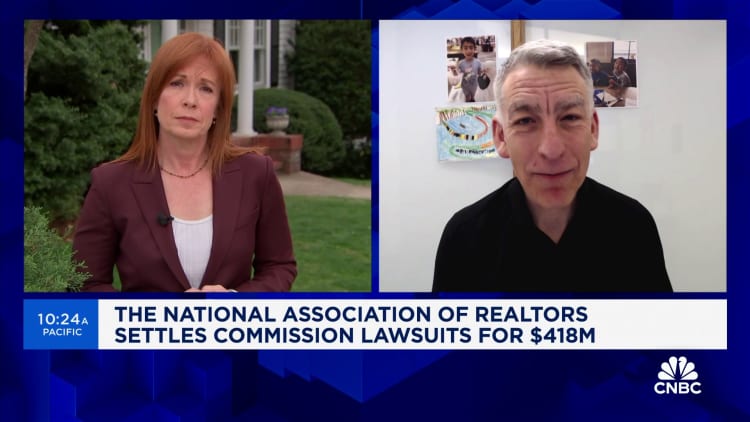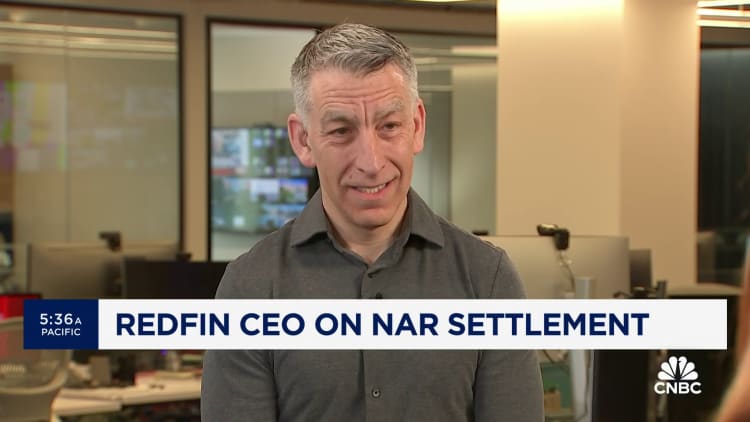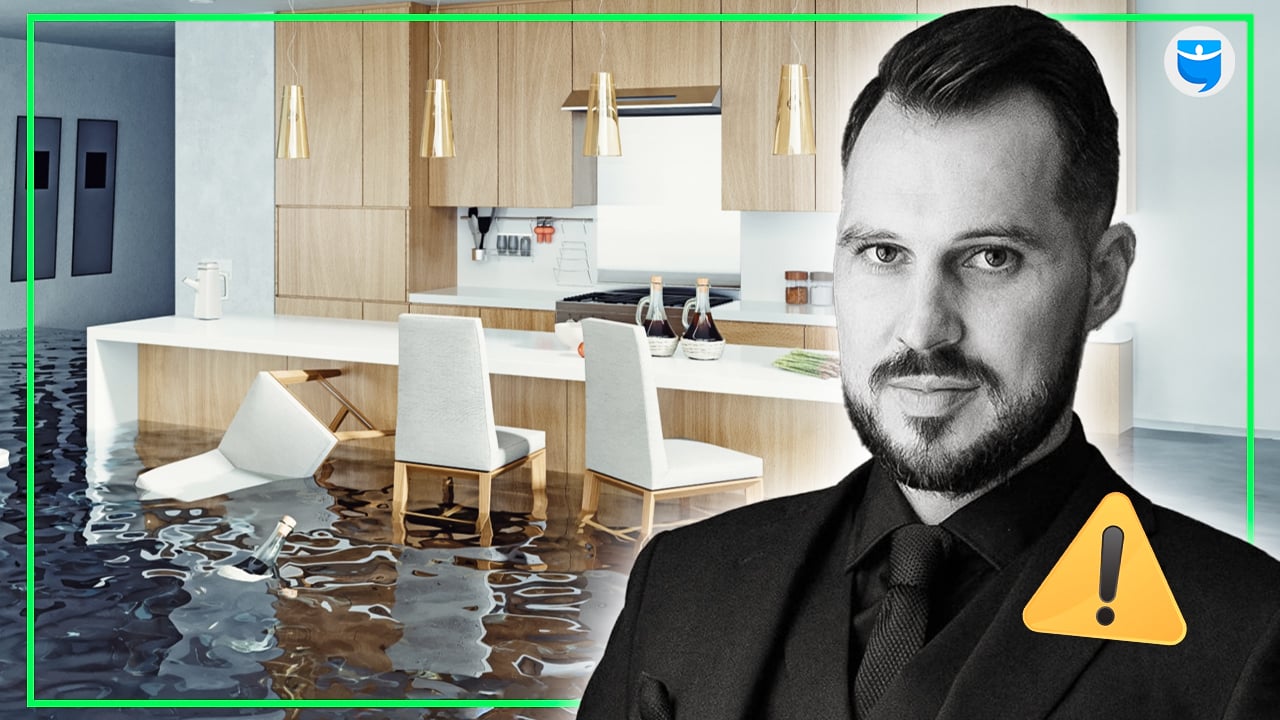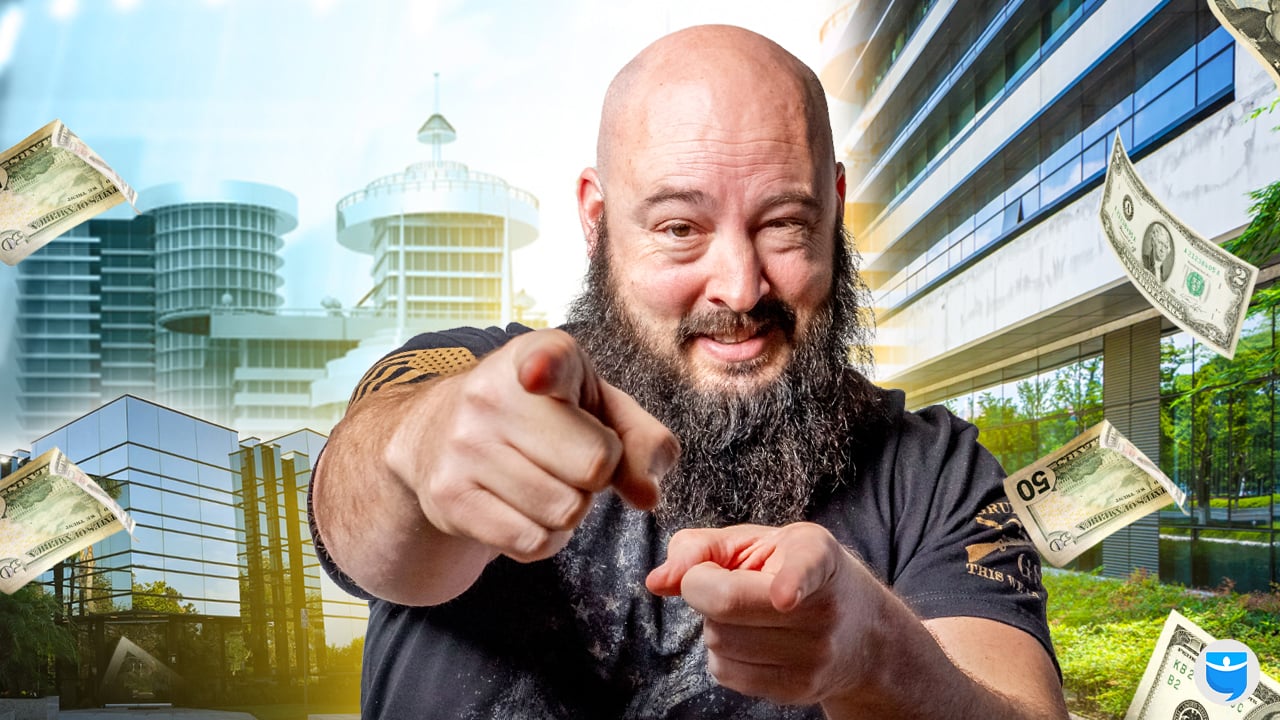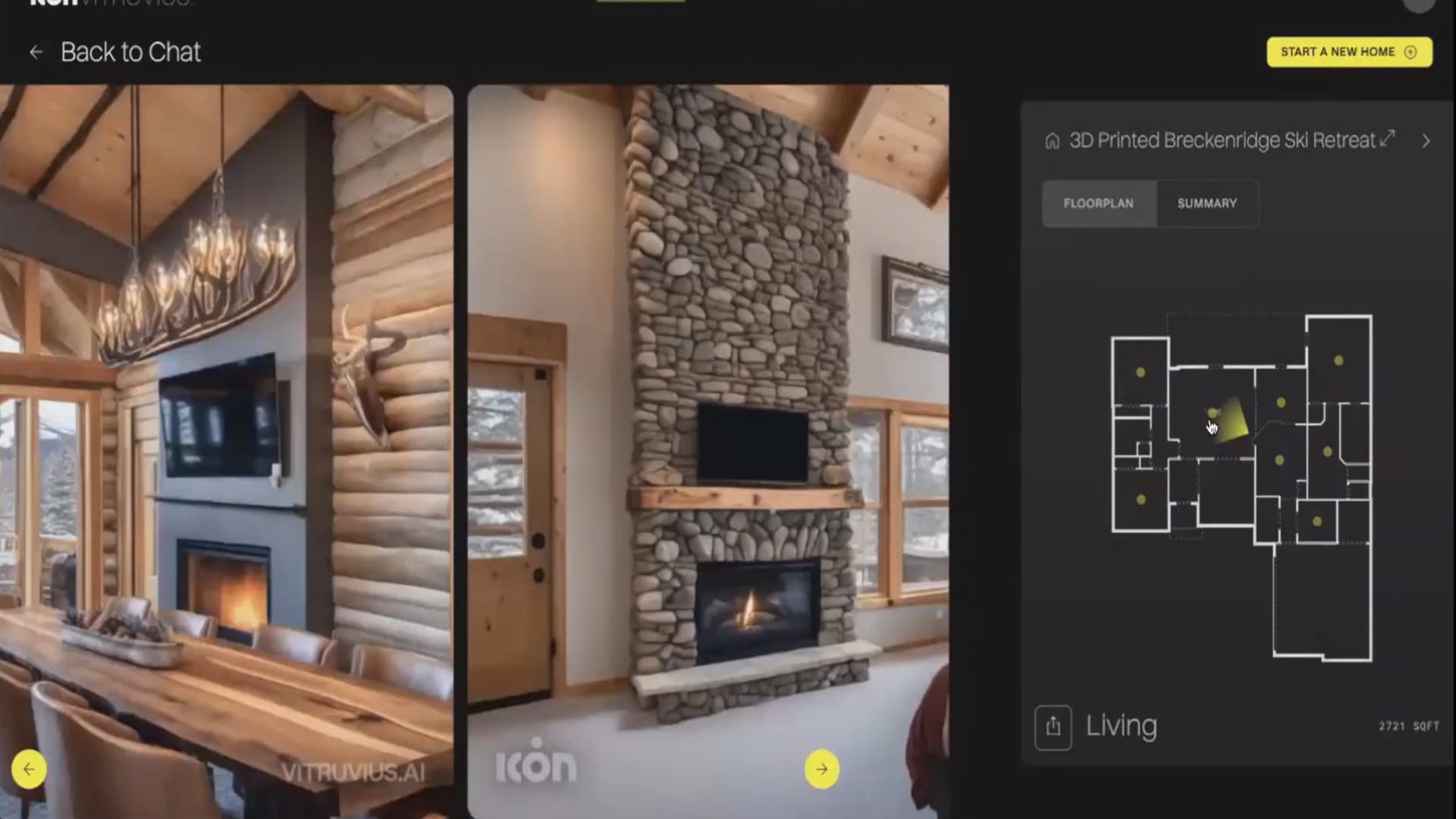NAR Settles for $418M, Buying and Selling Homes
A bombshell NAR settlement could bring wide-sweeping changes to the housing market. After a snowball of NAR lawsuits, the realtor association agreed to settle for a whopping $418 million and make critical changes to how real estate agent commissions are paid and how competition can be upheld. This significantly impacts anyone buying or selling a home and has life-changing effects for every real estate agent and realtor in the country. The New York Times’ Debra Kamin joins us to break the story.
Debra breaks down the enormous legal loss that NAR (National Association of Realtors) suffered last week and the impacts it will have on the housing market. First, we discuss the new agent commission rules, which may break the standard six percent fee that realtors are used to taking. These commissions are real estate agents’ livelihoods, and a new model that supports lower commissions could force many agents to leave the industry entirely.
We’ll also touch on the turbulent times NAR has faced recently, from sexual harassment scandals to changing leadership and, now, a massive settlement that could lose them more than half of their members. Will a new type of real estate agent form from the ashes of this century-old model? Or, could a brand-new way of buying and selling homes transform the housing market? Stay with us; we’ll give you the entire scoop.
Dave :
Hello investors. My name’s Dave Meyer and welcome to the BiggerPockets Podcast Network. Today we are covering a breaking news story. If you haven’t heard already, there have been a bunch of antitrust lawsuits lobby against one of the biggest trade organizations in the entire country, the National Association of Realtors. And just last week, NAR, the National Association of Realtors has settled these antitrust lawsuits and what was contained in those settlement really is the potential to change the entire real estate investing industry. And I know that might sound a little bit dramatic, but it is really true. This could really fundamentally shift the way that people buy and sell real estate. So today, in order to fully understand this super important topic, we’re going to bring on Debra Kamin, who is a journalist from the New York Times to discuss the most recent developments. Before we bring on Debra, I just want to acknowledge that this recent and unfolding story has created a lot of uncertainty and a lot of strong opinions about what might happen next, what should happen, whether this was the right thing to do or not. In today’s episode, what we’re focusing on is what we actually know because there’s a lot of speculation and we’re going to just have to wait and see how a lot of things unfold over the coming months. But our purpose here in bringing in Debra is not to say one way or another what should be happening, but instead to just say what has actually happened so we can all learn the facts and form our own opinions about what this means for the real estate industry. So with that said, let’s bring on Debra.
Debra, thank you so much for joining us today.
Debra :
Thank you for having me. It’s fun to be here.
Dave :
For our listeners who might not be real estate agents or familiar with the whole drama that’s been going on, can we just start with the basics and have you explain to us what the National Association of Realtors is in the first place and what is their significance to the real estate industry?
Debra :
Dave, such a good question and the word that I’ve been using this week as I’ve been talking about the fallout from the story, the words are invisible hand. Essentially the National Association of Realtors has been for a hundred years like an invisible hand that’s guiding the entire housing market because they are such a large and powerful trade organization. And because to buy or sell a home in the us, you basically have to be a member. Otherwise they make it incredibly difficult.
Dave :
And that’s for real estate agents who need to be members of the National Association of Realtors, right?
Debra :
Correct. Exactly, yes.
Dave :
And how do they make it difficult to buy or sell a house if you’re not a member?
Debra :
So there’s a couple ways and pretty much from the entire transaction, from getting the house on the market to physically getting into the house to show it to a buyer or a seller, to then even completing all the documentation that comes with a home sale NAR is involved from the get-go. The most important way that they’ve really practiced control over the market is through these things called multiple listing services or MLSs. These are just databases where homes are listed for sale. So if I am selling a home and I hire a real estate agent and I say, okay, let’s put this house on the market, they’re going to put it on something called the MLS. But in almost every city in the US the MLS is actually owned and operated by the local subsidiary of NAR. And in order to access that database and see the houses for sale, you have to be a member. So it’s basically if you’re not a member, you can’t see if the homes are even on the market. You can’t bring buyers to them. You can’t operate in this space as an agent.
Dave :
Okay. So NAR is this essential part of the real estate buying and selling industry right now, as you said, they are sort of this invisible hand over the last couple of years they’ve faced many lawsuits, but there’s been one in particular over the last few months that has been really important. Can you tell us about these antitrust lawsuits?
Debra :
Absolutely, and I want to be really clear, there’s one that was really important. There was one lawsuit that was, they lost in October, but the settlement that we’re talking about actually wraps all those lawsuits together and is a global settlement because all of these lawsuits have made the same accusation. NAR has set rules for how agents are paid for the work that they do for the commission that they receive, and even how that commission is communicated to them. And because they are so powerful and because they control so many aspects of the housing industry, there have been arguments against them that these rules are essentially anti-competitive. I don’t know if you know about the 6%, I don’t know how deep you want to get into this, but are we familiar with the 6% that people pay to buy and sell a home? Do you want me to dig into it for a sec? I think
Dave :
A lot of our listeners are, but let’s get into it because I think the details do really matter here.
Debra :
Yeah, so 6% is this number that when we’re talking about this settlement with NAR, everybody has been throwing it around 6% is essentially the standard fee that you almost always have to pay somewhere between five and 6% in America. If you are selling a home, this fee is not written anywhere. It is not set in stone, it is not required. And that has been n NAR’s argument. But because the way they’ve set up the rules and because there’s really been no way for agents to be competitive in real estate, everyone has essentially charged the same fee. When you sell a home and you pay 6% to your agent, that agent then will take half of that and give 3% to the buyer’s agent. If I’m selling my house, I pretty much just have to take on this additional cost of 6% of the sale price that I’m going to pay and commission to my agent, and then that agent’s going to go ahead and pay the buyer’s agent.
And in 2018, 2019, a group of home sellers in Missouri looked at the contracts that they’d signed with their real estate agents and realized that they did not know that they could have negotiated that fee. And in some cases they didn’t even know they were paying that fee until the money had already come out of the transaction and they thought we might have a, so they went and they got an attorney. And that spiraled into a class action lawsuit in Missouri that in October of last year, NAR lost and the loss was nobody was shocked by the loss more than NAR themselves. They never expected it. And since then it’s really been just like a domino effect. That brings us to where we are today.
Dave :
Thank you for explaining that. That was a great explanation of how this works and how we’ve arrived. At this point, I do want to ask a little bit about these contracts because I hear from real estate agents all the time and I know from my own personal experience that these commissions are technically negotiable. And so what is sort of the point here or why did the jury side with the plaintiffs here saying that there was actually this collusion to keep prices high when technically you are able to negotiate,
Debra :
So technically you are able to negotiate and that has been NA’s argument all along, but whether people actually are aware that they can negotiate and whether if they negotiate they are then put at some sort of disadvantage in the market is an entirely different conversation. The two pieces that were argued in court were not even really about the 6%. The first was this rule that NAR has that a seller agent can offer commission to a buyer’s agent. And by doing so, it has made commissions high. So if I’m an agent selling a house, when I’m telling my clients you need to pay commission, that commission needs to be big enough that I get my piece and the buyer’s agent gets their piece. So that has inflated these commissions up to 6% because half of it has to be split with the buyer agent. And there was actually a rule that NAR had that anybody who was a member of the organization had to follow that if I’m a real estate agent and I’m selling a house, I have to make an offer of commission on these databases where homes are listed to the buyer’s agents.
And basically what that means is buyer’s agents, if they’re taking customers around to see homes, can see before they even take people into the homes, how much they stand to make if they sell that home. So why would anyone offer less than 3% if they’re trying to sell a house, why would they say, Hey, come see this house. I’m only going to give you 2%. You’re not going to get any buyers to come buy this house that you’re trying to sell. And that has kept commissions inflated artificially. So that was the first thing the jury said, this is a conspiracy, this is price fixing. There’s no room for competition here because these rules have made it that everyone’s offering the same thing because otherwise they can’t compete. The other aspect of the argument was this idea that offers of commission are made on these databases in the first place because that means that only people who are in this organization and following these rules can sell homes. It keeps all other people who might offer different types of commission or might even sell houses differently if they’re not members of NAR. It keeps them out of the market because if you can’t access the MLS, you can’t access home listings. You can’t sell a home without accessing home listings. So those were the two pieces that actually came down and were discussed court.
Dave :
Alright, so now that we know the basics of these lawsuits and where the 6% commission rate came from, we’re all wondering what happens next? What do these changes mean for you? Whether you’re an investor, an agent, or just someone trying to buy a home? Deborah spells out the scenarios we may see right after the break.
Welcome back to bigger news. I’m here with Debra Kamin from the New York Times talking about the breaking in NAR settlement and what it means for the real estate industry as a whole. Thank you for explaining that. Debra. I know this is sort of a complicated process, but the details do really matter here. And for everyone listening, I know you probably have your own opinions on which way you would’ve cited if you agree with the jury that this is collusion or if you agree with the NAR that this is a perfectly fair practice. I totally understand this is a complicated topic, but today in our conversation with Debra, I want to focus on what might happen next because the jury’s already made a decision and so let’s look forward into how this might impact all of us in the real estate investing industry. So Debra, tell us a little bit about this settlement. We just heard about the judgment that was made back in October. What is the settlement that took place over the last week?
Debra :
Yeah, so Friday morning, we’re talking really early Friday morning like 1:00 AM Friday morning NAR. And the attorneys for the plaintiffs in these settlements decided to settle and it came for many people as a surprise when the verdict came down in October, NAR stance really was that this was a false verdict. There was no price fixing, there was no collusion. They were going to appeal, they were going to appeal, they were going to appeal. That was their line. What happened after that lawsuit is the floodgates essentially opened and all these other copycat suits started being filed and by the time we got to Friday, NAR was facing something like 20 different lawsuits all making the same accusations, and the pressure had really become insurmountable. So they decided to settle. The amount of the settlement is $418 million, which is a fair amount of money, but what’s more important is the rules that they’ve agreed to change as a result of the settlement.
And those include that sellers agents can no longer make these offers of commission to buyer’s agents using the databases. That’s the main thing. And there’s other rule that homes have to be entered into these databases that are controlled by nar. That rule has also changed. So what it’s done is really for the first time in a hundred years broken this hold that NAR has had over the real estate industry and allowed the possibility for competition to enter the market. And we all know that when competition enters the market, prices tend to go down because people can compete and offer the safe services for less or offer different types of services, and that’s what we’re going to see.
Dave :
And can you tell us a little bit just logistically how this new competition may play out and drive prices down?
Debra :
Yeah, absolutely. So there’s been a lot of questions people have said, how is it possible this is going to lower prices if all this means that now buyers are going to have to pay their own agents? And the reasoning behind it, every economist I’ve spoken to has said the same thing. When you sell a house and you sit with your agent and you set the price that you’re going to put the house on the market for, it’s a number you agree upon with your agents. Anyone who’s ever sold a house has gone through this and the agent says you’re going to pay commission. That amount of commission then gets baked into the home sale price so that if I’m selling a house that’s worth a million dollars or I want to take home a million dollars from the home sale, we tack on enough so that the commission can come out of that sale and I can still walk away with money.
So home prices have been elevated artificially according to the lawsuit because they have included this high commission rate for so long. So if those commission rates go down, the amount that’s baked into the home price is also going to go down, which is going to lower home prices across the board. It might just be one or two percentage points, but when you think incrementally about the size of the US housing market and the amount of money that Americans have traditionally been paying for commissions, it’s something like a hundred billion a year that Americans spend on home commissions alone, economists forecast that number is going to go down by like 20 to $50 billion. So think about that reduction into home prices across the board that will lower home prices. It will also make the cost of moving lower because the commissions involved with moving are lower, which might encourage people to move more often, which will put more fluidity into the housing market and really just give a bit of an injection to a housing market that is so stagnant right now because affordability is so dire for so many Americans.
Dave :
I get how commissions could get forced down or a downward pressure could be applied to the seller side commission. Right now, if you’re a seller, you’re like, Hey, I only want to offer 2% or I’m only going to work with an agent who offers for two or 3%, but the part of the puzzle here that’s confusing to me is the buyer side. So if sellers aren’t going to pay for a buyer’s agent, does that mean we’re going to see a complete shift to where buyers have to pay a commission or a flat fleet or somehow pay for the real estate agent that they presumably will use?
Debra :
Dave? It’s such a good question and it’s one of the big things that people are most concerned about with this settlement because for so many buyers, especially first time buyers, they are barely scraping together enough pennies just to have a down payment. So now think, oh my God, now I have to pay commission to my agent on top of this. How am I possibly going to afford this? It is highly problematic. That being said, what this is going to do is allow for there to be new models for how buyers work with agents to enter the market. The way that we buy and sell houses today in the US is radically different than it was 50 years ago. It used to be if you wanted to buy a house, you called a real estate agent, they picked you up in their Volvo, you drove around, you saw the houses that they knew that were on the market, you looked to ’em, that was it.
Now 99 to a hundred percent of home buyers are using sites like Zillow and Redfin look at the market themselves before they work with an agent. This doesn’t mean that buyers still don’t need agents. This is probably the most important financial transaction of someone’s life and there’s a very strong argument to be made for working with an expert, but it does mean that perhaps what the rate that we’re paying should shift or should evolve or should somehow represent a different type of compensation because the process is different. So we might see agents who are charging a flat fee or charging by the hour. We might see sites like Redfin and Zillow making it so you can look at home listings and then buy through those sites the same way we can now book travel through Expedia and Kayak when we used to have to go through a travel agent. There’s a lot of options here for the entire market to completely be restructured and recalibrated because this choke hold that NAR has really had, and I use that word carefully, it’s been broken for the first time.
Dave :
Deborah, are there any models from other countries or elsewhere that could be an example of what might play out here in terms of new models for agents and buyers working together that we may see here in the us?
Debra :
That’s a really good question, Dave. I’ll tell you what I do know, and I’m not an expert on international home buying by any means, and I don’t want to pretend that I am. I will tell you that real estate commissions in the US are among the highest in the developed world. It’s something like number three out of all countries. In most countries, they’re not 6%. There’s something closer between two and 3%. In a lot of countries, buyers don’t use agents. In some countries dual agency where an agent represents both people is much more common. There are pros and cons for that argument. Some people say it’s great because it saves money. Other people say you have one person working both sides of a negotiation which causes problems. So yeah, I think actually a really good way for real estate agents to think, oh my God, what’s the day after going to look like once they recover from the blow of this news is to look at other countries and see if there is a model that would apply. Obviously the entire economy in the US is different than other countries and our housing market is different. So it’s not a perfect comparison, but it would be a good place to start to get some ideas.
Dave :
Yeah, it’s super interesting to think about. I am still trying to wrap my head around it because it’s just so foreign from what I’ve experienced being in this industry for the last 15 years. I’m wondering if you think there’s an opportunity or one of the models may be fewer people using real estate agents, and I am a big proponent of people using real estate agents. I think they add a tremendous amount of value and it sort of worries me a little bit to think about, particularly like you said, first time home buyers trying to go it alone on what can be a complex and really financially intensive decision.
Debra :
I totally agree with you. I will say I have gotten a lot of angry emails over the past few days from real estate agents and there are a lot of really high emotions right now. Completely understandably. Part of the reason for that is that real estate agents have been very much left on their own to make their own money to survive financially and then also to deal with the fallout of this lawsuit without any sort of support or guidance. Most of them are not employees, they’re freelancers. Even if they work for brokerages, they have to split that commission with the brokerage they work for, but they don’t have the benefits of being a full-time employee or the security or the safety. And most of them have been paying dues to NAR for years loyally and then feel like after putting in all that money and all that time NAR went to court, they lost and now it’s the agents who are left seeing their livelihoods potentially halved or slashed, and then also being vilified by some people who are saying, well, hey, I don’t even need an agent in the first place.
What I definitely think will happen as a result of this ruling is we are going to see fewer agents in the marketplace. There are a lot of real estate agents in America, tons and tons. So many people during the pandemic especially went and got their real estate license because it’s not that difficult. It takes about 40 to 50 hours of certification and when the market is really hot, you can make a lot of money really quickly selling a home. Those agents, the ones who are only selling a home casually here and there probably will leave the market. The ones who are really good at their jobs, the ones who really do provide an extremely useful benefit to buyers and sellers will stick around, but we’re going to see probably a time of transition before it flattens out. And then the ones who stick around, they have to change how they are paid and that’s going to be painful for some of them.
Dave :
Absolutely. Yeah. I forget the exact data, but there’s some stat where it shows something like 20% of agents do 80% of the volume. So there’s about 1.5 million members of NAR and as of the last reading, the amount of inventory on the market in the United States is 900,000,
Debra :
Right? So imagine how competitive it is. This is why real estate agents are panicking understandably. There’s so many agents, there’s so few houses, and now they’ve just been told even if you do sell the house, you’re going to make less than you plan to make less than your entire financial structure was built around. This is really tough news. The good news is that if we do see fewer agents, the ones who stick around stand to be more successful once the dust settles from this, I hope that’s at least comforting. That
Dave :
Is the feedback I’ve gotten. I have a lot of close personal friends and professional friends who are real estate agents, and that does seem to be sort of the prevailing belief here is that there is going to be some short-term pain. I think that’s the unfortunate news for the real estate agent industry, but a lot of the people I know who have built successful businesses over the last 10 or 20 years feel that what this will likely do is eliminate a lot of the people who are part-time agents, and I actually even know a couple part-time agents who are like, yeah, I’m probably not going to renew my license and have sort of owned up to that. This is no longer going to be worth it to them. But the people who make this their profession and who do add tremendous value to this industry, and especially obviously to home buyers, but in our industry of real estate investors, they add a tremendous amount of value. I think a lot of the experienced people I’ve talked to have echoed what you said, Debra, is that they feel like this might actually be beneficial to them in the long run, but it’s going to be an uncertain period here for at least six months a year, and it maybe even a little bit longer. Alright, we have to take one more short break, but stick around because Debra’s going to give us her insights on the future of NAR right after this.
Welcome back everyone. I’m here with real estate reporter Debra Kamin. Let’s jump back in.
Debra :
One of the other criticisms of NAR over the past few months that I’ve heard is that they have not done their job as a trade organization of convincing people of the value that real estate agents bring. So many people now hearing about this verdict are saying, oh, well, I’m just going to not use an agent. And okay, fine. Obviously you can buy anything you want with or without an agent. This is one of the nice things about living in America that is part of the economy, but there is something to be said for being guided through the transaction NAR and their role as the largest most powerful trade organization in the US has put out some sort of materials about the value of real estate agents, but they’re not getting into the market. People who are buying and selling homes, the message is not resonating. And that’s a problem too for real estate agents, especially for those who are thinking, wait a minute, is my entire financial future now at risk because of this ruling that they lost in court? So there’s a lot of anger towards them, and I think it’s understandable. There was a lot of arrogance going into this case and they did not expect to lose.
Dave :
Well, they have been quite successful historically at sort of swatting down lawsuits because they do get sued quite a lot and they have, but well,
Debra :
I’ve spent a lot of time examining their financials and they spend a lot of money on lawyers,
Dave :
Aren’t they? One of the biggest trade lobby groups in the whole country,
Debra :
Dave, they are the largest political action committee in the country. So not only are they the largest trade organization in America, they are the largest political action committee, and that has been really, you just hit the nail on the head. That has been the key to much of their power because in addition to being a trade group, they give money to candidates who support their agenda and they spend money to fight candidates who don’t support their agenda. So they’ve been able to really maintain a lot of their power and influence through that avenue. Now, if they stand to lose as many members as is projected, and some of the projections are, they’re going to lose up to two thirds of their membership. That also means they’re going to lose a lot of their political donations, their members who fund their pac. So that means that the lobbying arm that’s pushing a lot of these agendas in Washington is going to be a lot weaker. So that’s the real fallout couple years from now that I have my eye on for what the real impact of this is going to be. It’s not just about commissions being baked into home prices.
Dave :
Wow. And Kailyn, our producer just sent me a note that the amount spent lobbying by NAR in 2023 was $52.4 million.
Debra :
That’s actually probably not even the number because that’s
Dave :
The number really, it’s
Debra :
Higher. Well, that is the number that they have officially spent through their own channels, but they also make a lot of donations to other groups who then filter that donation to other groups. And that in addition to NAR, you have to remember there’s the National Association of Realtors, but then at every state, there’s the California Association of Realtors then have had Association of Realtors, and then every state has its own small city groups. So there’s the San Diego Association of Realtors. Each of these groups also have political action committees and also raise money, and a lot of the funds are flowing back and forth and then being moved to nonprofits, and this is a project that I’ve been working on. It’s a story that we haven’t published yet, but I’ve been tracking their finances for quite some time to really see the size and scope of this machine of money coming from the realtor lobby and where it goes, and it’s monumental.
Dave :
Wow. Well, it really makes you wonder what the future of NAR is going to be if there’s a lot of dissatisfaction among its members. People are projecting such huge losses. Do you have any thoughts on how this might shake out for the organization itself?
Debra :
I don’t see a day where NAR is gone completely. I think that they a serve an extremely important role in the housing industry and the real estate industry, and they’ve been around for a very long time. There’s a lot of legacy and a lot of history, but I also cannot imagine a future where they have the same unchecked influence and sort of wild power that they had a year ago. They have been through so much over the past year, not just the lawsuits, but also the sexual harassment. Have we talked about that? Do we want to talk about the sexual harassment?
Dave :
I think we should because their organization I do. But yeah, so I know there’s been a lot of internal turmoil at NAR, but could you fill us in?
Debra :
Yeah, I mean, I enter the story at this point in many ways. When I became a real estate reporter at the New York Times, which was a little bit over a year ago, I had never heard of NAR. Most people who have not bought or sold a home or not directly involved with real estate investing have never heard of NAR. They just know that they have a realtor and they think realtor is a normal word. They don’t even know that realtor is a word that has been trademarked by NAR, and you cannot use the word unless you are a member. None of this was on my radar. So I started looking into them and I became aware of many allegations of extreme sexual harassment and bullying at the National Association of Realtors. Most of those allegations were directed against one man, Kenny Parcell, who was the president of the organization.
And at the times, I published an expose on these allegations last August, and that was really the moment that NAR entered the global stage in the conversation. A lot of people who read that story had never heard of them and did not know how powerful they were. Kenny Parcell resigned two days after the article ran, and there was a lot of uproar at the organization from staffers because not only had he allegedly been sexually harassing women, many women who had been whistleblowers were paid off. There had been lawsuits that had been quietly closed, and there were a lot of calls for the CEO to resign and for there to be other staffing changes. All of this was happening in the background when NAR went to court in October. So since that moment, they’re now on their third president in six months and they’re on their second CEO. There’ve been a lot of other resignations since then. So they’re having all of this turmoil with their leadership and all these legal challenges, and every single one of these events is like a cut, right? So you add up enough cuts, their power has really been blunted because of it, and their reputation has been blunted.
Dave :
Wow. Yeah. It sounds like we’re just sort of at the beginning. I know we’ve, A lot has already happened per your reporting and multiple leadership changes, multiple lawsuits, but I think this is going to be a story that continues to unfold, it sounds like for months on the NAR front and certainly on the commission front and how this all impacts real estate agents. So Debra, we’ll have to have you back hopefully sometime in the near future to fill us in on how this story continues to evolve.
Debra :
I’d be very happy to do so. Thank you.
Dave :
Thanks again for joining us, Debra. We appreciate it.
Debra :
Of course.
Dave :
Another big thanks to Debra for joining us for this breaking news episode. Now, I know that this is a very important and often controversial and sometimes emotional story that really impacts every corner of the real estate investing industry. I, myself, am still trying to think through all the implications of this settlement, and I do want to recognize that for real estate agents and people who work with them, this can be a difficult and maybe a frightening time right now, and we would love to hear from you. If you have some comments or thoughts on what this means for you and your industry, we would really appreciate your input. So if you’re watching this on YouTube, please comment in the comments below. We also have BiggerPockets forums about this, BiggerPockets blogs that you can comment on, because we want to hear from those of you who in our industry, that this impacts whether you’re a real estate investor, a real estate agent, or someone else in the real estate industry. Thank you all so much for listening, and we’ll see you again soon on the BiggerPockets Podcast Network on the Market was created by me, Dave Meyer and Kaylin Bennett. The show is produced by Kaylin Bennett, with editing by Exodus Media. Copywriting is by Calico content, and we want to extend a big thank you to everyone at BiggerPockets for making this show possible.
Help us reach new listeners on iTunes by leaving us a rating and review! It takes just 30 seconds and instructions can be found here. Thanks! We really appreciate it!
Interested in learning more about today’s sponsors or becoming a BiggerPockets partner yourself? Email [email protected].
Note By BiggerPockets: These are opinions written by the author and do not necessarily represent the opinions of BiggerPockets.






